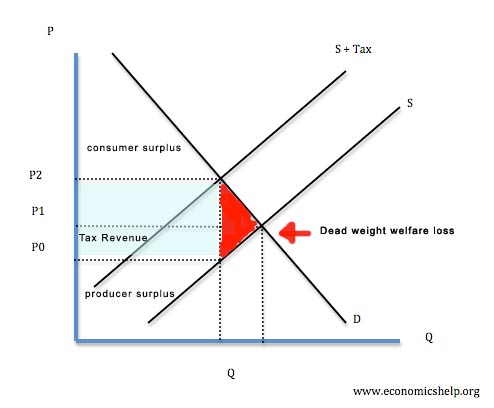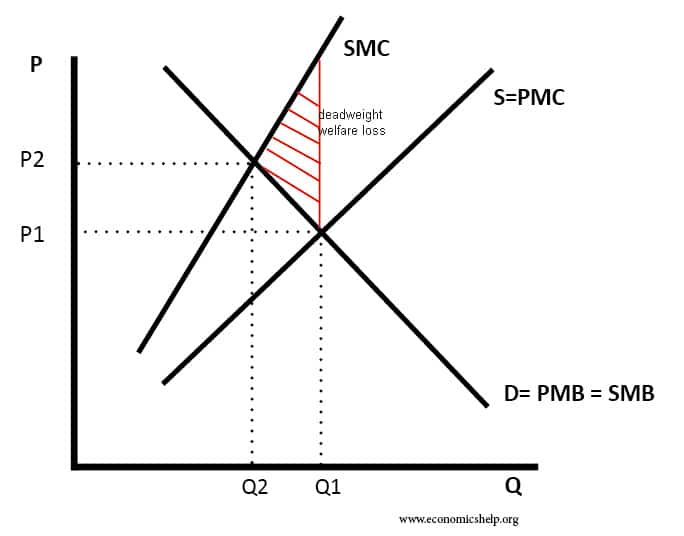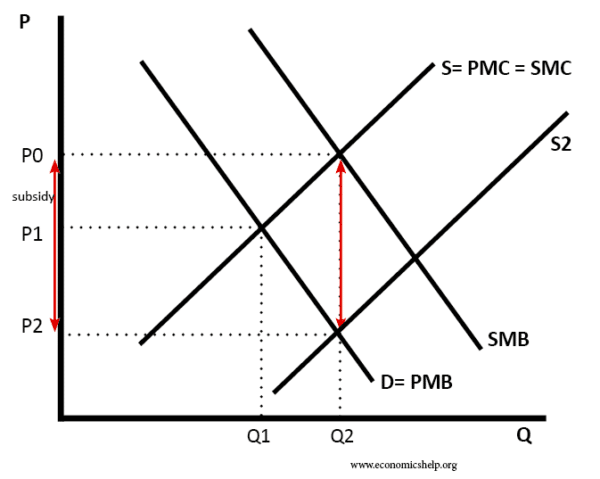Readers Question: I heard this over the radio one day and was dumbfounded. Can you please explain what the phrase means? Higher tax rates exact real economic costs: Maybe two dollars in deadweight loss to the economy for every extra one dollar collected. I am not asking what your beliefs are (liberal or conservative), I just want to know what it means based on fundamental economics.
Taxes can distort economic behaviour.
For example, suppose when petrol costs 50p. You make 1 journeys a day.
- If the government puts a tax on 40p on petrol, it will now cost 90p. This may cause some people to stop travelling. This will lead to a loss of consumer surplus. You no longer buy a good you would have consumed without the tax
- Also, producers (petrol retailers) will lose out because they are selling less.
- Also, the government doesn’t get tax revenue from the people who don’t travel.
Therefore there is a net welfare loss to society.
The above diagram shows deadweight welfare loss that arises from a simple tax. It is the area showing loss of consumer and producer surplus and no government tax revenue.
Income Tax and Deadweight Welfare Loss
Another example is increasing the income tax rate. Higher income tax makes leisure more attractive compared to working. It decreases the incentive to work and do overtime. It may decrease the number of people going into high paying jobs.
Therefore because of this substitution effect, people work less. But, also if the supply of labour falls, firms will produce less. In extreme cases, some suggest there may be a ‘Laffer curve effect’. This is where tax revenue actually falls because higher income tax rates discourage people working so government collect less tax revenue despite higher tax rates.
Again you can see a deadweight welfare loss. People earn less, firms produce less and government tax revenue may not increase but actually fall.
However, this analysis is quite simplistic and ignores certain facts.
Income Tax and Incentives
The elasticity of labour supply tends to be very inelastic. If income tax increases, your disposable income falls. This acts as an incentive to work longer hours to compensate for the fall in income. (known as income effect)
Therefore, although work may be less attractive compared to leisure, people may need to work longer hours to achieve a target income (to be able to pay bills e.t.c.)
At most levels of income, these tend to balance each other out. In addition, there are often practical difficulties to changing your hours; just because income tax is increased, your boss is unlikely to allow you to do three hours a week less.
Certainly at some tax rates, (e.g. a marginal rate above 60%, it is likely we will see substitution effect dominating and people would choose to work less.)
Also for the very high earners, it may be practical to actually move abroad and escape high tax rates. But, the disincentives of higher income tax are often exaggerated.
Deadweight Welfare Loss and Specific Taxes
In theory, the government should place a tax on goods with negative externalities (cigarettes, petrol, alcohol, e.t.c.). This is because negative externalities are over consumed. This over-consumption leads to a deadweight welfare loss.
If the government tax this good, it makes people pay the social cost and achieve the socially efficient level of output at Q2. In this case, the tax is reducing deadweight welfare loss.
~
Positive externalities
Similarly, goods with positive externalities are under-consumed – leading to a deadweight welfare loss
If the government uses this tax to subsidise positive externalities (public transport) e.t.c. This can increase economic welfare.
Also, the example of the petrol tax needs more analysis. If we tax petrol, people may choose not to drive, leading to a deadweight welfare loss. However, instead, people may buy a bike and cycle. Thus economic welfare is created in different markets, so there is just a transfer of activity from one market to another.
Related
- Tax cuts
- The religion of Tax Cuts (which gives away my political views on the matter.)



